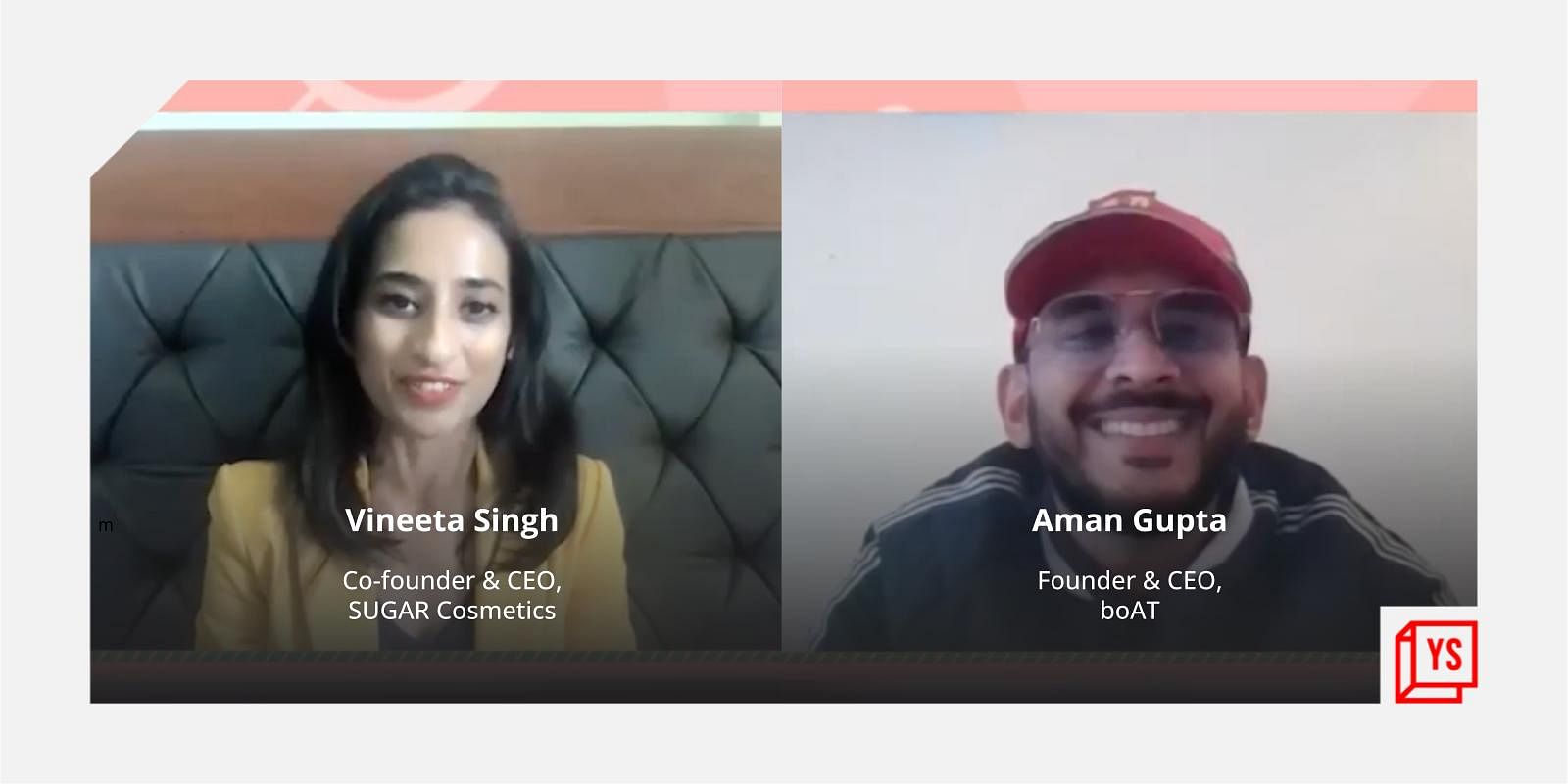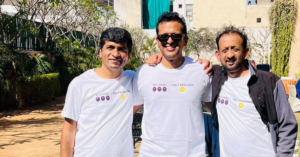The first season of Shark Tank India has managed to bring conversations around startups, funding and entrepreneurship to the dinner table of Indian households. Viewers across the country have watched the show with rapt attention as entrepreneurs or budding entrepreneurs have pitched their business ideas to the ‘sharks’ or investors on Shark Tank India, who are self-made billionaires and noted startup entrepreneurs in their own right.
As per the data shared by Sony TV, the channel that airs the show, ‘sharks’ invested close to Rs 42 crore in 67 local businesses in the first season. As the first season comes to a wrap, YS Founder and CEO Shradha Sharma caught up with two of the founder-turned-investor ‘sharks’ — Aman Gupta, Founder & CEO at boAT, and Vineeta Singh, Co-founder & CEO at SUGAR Cosmetics. In an unfiltered conversation the duo shared their journeys as ‘sharks’ and revealed the ‘dos and don’ts’ for startups when they pitch to an investor.
“The national animal of the country is no longer a tiger, it’s a unicorn! Everybody wants to be one,” quips Aman, as he cautions startups from incessantly chasing funding before building the product. Of course, he is not referring to the fabled one horned horse-like mythical animal but startups that are valued at or over $1 billion.
“A lot of founders come in and say hame seedha unicorn banana hai (we want to straightaway become a unicorn). You pick up a problem, solve it, build a product/brand, build a market, a community and then think about reaching the unicorn status. There are some entrepreneurs who start thinking of money first. Don’t run after money, it will come,” he adds.
Reminiscing of his humble beginnings, Aman had recently shared his own story on social media about how he started his business from a restaurant. His first office, or working space, was at a cafe in Hauz Khas in New Delhi. As taking food inside the cafe wasn’t allowed, Aman used to sit in a nearby park for lunch. He added that he looks at a photo from back then time and again to remind himself of his “humble” beginnings. “Shark bhi hain, par insaan bhi hain (While I am a shark, I am a human being too,” he banters.
“We did not run after money. In fact, we did not get the money, leave alone running after it. Then when we stopped, it chased us. If you are doing the right things, if your Product Market Fit (PMF) is there, brand is built, community is established, things will start falling in place,” he added.
According to Vineeta, early stage entrepreneurs should not look at small amounts of money to invest in performance marketing as they are at a stage where they are dealing with hosts of other problems such as keeping up with their stocks, working capital and problems of demand. Therefore, performance marketing should be the least of their priorities.
“When such an early stage startup comes in with a pitch to put money in digital marketing, I find it very scary because in those early years you should only be solving for working capital and getting your PMF right. And when that is there, your product will automatically start flying. They should not turn the tap of performance marketing before getting to at least a couple of crores in net revenue per month,” she adds.
Vineeta has a high level of trust and respect for entrepreneurs who are not afraid of failures and have braved through some “not so successful” experiments in the past.
“For me, I know this person is not going to run away at the first sign of failure. As an investor, I would think about that as a serious criterion because one of the first things that happen is that you raise money and then you feel that that money is not your responsibility and then when you run out of that money, you decide to go back to a job,” she says.
‘Who run the world’
Shark Tank India also brought to light the fact that more and more women are taking the entrepreneurship plunge. For Vineeta, who has been a strong advocate for women-led-startups, it was one of the biggest reasons to sign up for the show.
“A lot of young women, older women, women in Tier II and III cities will see the show and think that they can also be ambitious and entrepreneurship is for them as well. There are like 20 different ways of being an entrepreneur and the Steve Jobs template that we all have grown up aspiring to, is not the only template for being a successful entrepreneur. Giving these unique diverse templates through all these different stories of all the pitchers as well as the sharks themselves (three are women), is a great takeaway,” she says.
‘The marathon’
There are days in an entrepreneur’s life when the frustration of not being able to reach a certain point of success or a goal reaches a crescendo. How does one sail through those restless times? For Vineeta, the marathon mindset keeps her grounded.
“A marathon actually teaches you a lot about just showing up every single day and not having to worry about anything else. Entrepreneurship is like running a marathon. Quit nahi karna hein bus.(Just don’t quit) You have to pace yourself and stay consistent. Just the idea of being okay with letting people race past you and focusing on putting one step after the other rather than focusing on other people’s success, will help you build. You can’t predict when success will happen for you, the only thing that you can control is just showing up every day and being consistent,” says Vineeta.
She quotes her husband Kaushik Mukherjee, who is also a co-founder in her startup, “Some will get there faster, we will get there stronger.”
While Aman is aligned with this marathon philosophy, he doesn’t see himself chasing the finish line of this race which according to him has become “endless” for businesses. He brings in a Bollywood twist to the table and quotes from the movie ‘3 Idiots’ –“Don’t run behind success, achieve excellence first, success will automatically come looking for you”.
Amused by the eruption of new terms such as decacorn (a startup valued at or over $10 billion) and hectocorn (a startup valued at or over $100 billion), he doesn’t give in to the pressure of trying to enter any of these elite clubs and just believes in showing up at work every day to keep himself and his customers happy.
“Ye race katham nehi hogi. (This is a never-ending race) I don’t care frankly, you keep doing the right things, keep selling, keep your consumers happy and most importantly, keep yourself happy. I love to go to work every day. So for me, till the time I’m loving what I’m doing, I’ll keep doing it.”
Both ‘sharks’ conclude that in the end, one has to enjoy their journey, that’s the biggest reason people pursue entrepreneurship.
You can watch videos from all the sessions of Brands of New India Mega Summit here. Don’t forget to tag #BrandsOfNewIndia when you share your experience, learnings, and favourite moments from the event on social media.
For information on future events, collaborations, and information regarding the D2C ecosystem, please visit our website.









